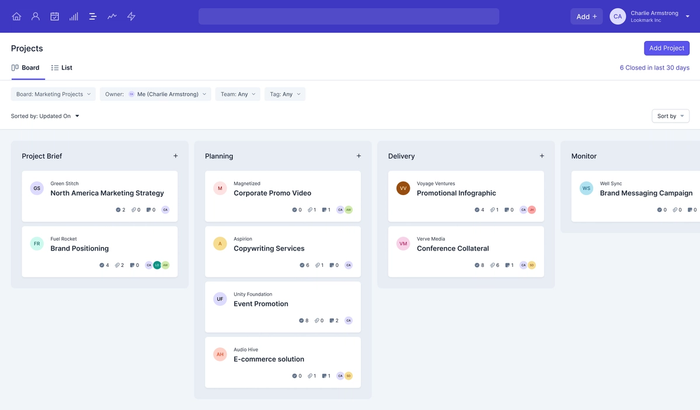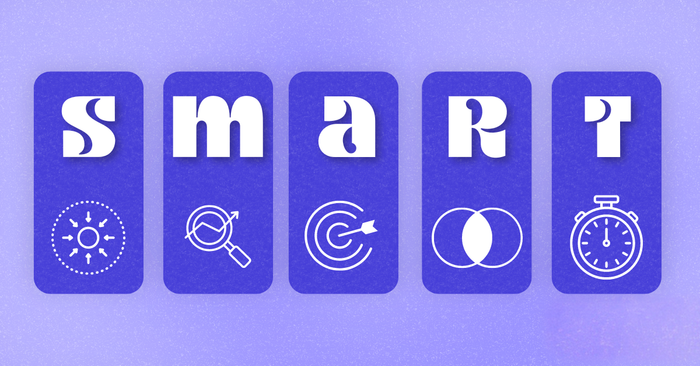Whatever industry you’re in and whoever your clients are, your work likely involves a lot of projects in some form or another. Even the smallest project seems to involve countless moving parts — all of which you need to carefully coordinate and track — which can make the whole process stressful.
If you’re struggling to stay on top of your projects, customer relationship management (CRM) software might just be the answer you’re looking for. A CRM enables you to keep all of your project data in one place, automate routine tasks, and track your outcomes.
In this article, we’ll look at how to use a CRM for project management, including best practices and how to resolve common challenges so that you can keep your projects running as smoothly as possible.
Why use a CRM for project management?
There are plenty of project management tools available to choose from, ranging from DIY spreadsheets to dedicated enterprise-level software. In many situations, a CRM like Capsule provides all the features you need to manage your projects effectively.
Although CRMs are often associated with sales, many core features perfectly suit project management. Here are some of the key benefits.
Improved organization and planning
Managing a project involves juggling numerous tasks, timelines, and resources. The organizational features that make CRMs great for sales processes are equally valuable for coordinating and planning your projects.
Most CRMs offer robust task management capabilities, where you can create and assign tasks to team members, set deadlines, and track progress in real time. Capsule’s Tracks feature takes this a step further, allowing you to create templated task lists for your team. When everyone knows exactly what needs to be done next, your project execution will be more consistent.
Capsule also provides dedicated project management features ideal for overseeing complex projects. A Kanban project board gives you a quick visual overview of all the key stages and your progress, so you can easily identify bottlenecks, reallocate resources, and keep your project on track.

Better stakeholder management
Effective project management isn’t just about your internal processes — it’s also about keeping all stakeholders informed and engaged. CRMs excel at managing relationships, making them perfect for this aspect of project management.
With a CRM, you can maintain comprehensive profiles of all project stakeholders, including team members, clients and vendors. This allows you to easily access contact information, communication history and preferences, ensuring you always have the right information at your fingertips.
Communication is a key part of keeping your stakeholders up to date. Many CRMs integrate with popular email providers like Gmail and Outlook, allowing you to manage all your project communications from one place.
Enhance your communication strategy further by combining your CRM with email marketing software. For instance, you can use Capsule with Transpond to set up and send targeted email sequences for various project stages, from kickoff announcements to progress updates and final deliverables.
Data-driven decision making
One of the most powerful advantages of using a CRM for project management is the wealth of data it provides to inform your decisions. Your CRMs can track and analyze your project performance, providing valuable insights for current ongoing projects and future planning.
By monitoring task assignments, completion times and workloads, your CRM can help identify high-performing team members, bottlenecks, and other areas where you might need additional resources or training. This information is invaluable for optimizing your team’s performance and improving project outcomes.
You can also use your CRM to track project costs, time investments, and outcomes, enabling more accurate project ROI calculations. By centralizing your project data and providing powerful analysis tools, CRMs enable you to make data-driven decisions for better team efficiency, stakeholder satisfaction, and project outcomes.
Common project management challenges (and how your CRM can help)
Even the smallest project can come with big challenges. However, a well-implemented CRM can address many of the project management issues you’ll face. Let’s explore some common challenges and their CRM-based solutions.
Project timeline management
The challenge: Keeping projects on schedule and managing deadlines
The solution: Visual timeline tracking and automated reminders
For every project, there’s always a deadline looming just around the corner. Missing these deadlines can lead to cutting corners, budget overruns, and unhappy clients.
With a CRM like Capsule, you can create Kanban boards for your projects, making it easier to track progress and identify potential delays before they become critical. You can quickly see which tasks are in progress, completed, or overdue. This visual approach makes it easier to spot bottlenecks and adjust your timeline as needed.
You can also set up milestones and link them to specific tasks or deliverables, while the calendar allows you to set up automated reminders for key deadlines, ensuring that nothing falls through the cracks.
Resource allocation
The challenge: Efficiently distributing workload and managing team capacity
The solution: Centralized resource management and workload tracking
Balancing workloads and ensuring that you’re making the best use of your team’s skills and availability can be complex, especially when you’re managing multiple projects simultaneously.
Your CRM can serve as a central hub for your resource management. In Capsule, you can create detailed profiles for each team member. By tagging team members with their specific skills or areas of expertise, you can quickly identify the right person for each task.
You can also use the task management features alongside Tracks to assign work and track progress. This gives you a clear view of each team member’s current workload, making it easier to distribute tasks evenly and avoid overloading any individual.
Post-project evaluation
The challenge: Gathering insights and applying lessons learned to future projects
The solution: Automated feedback collection and data-driven analysis
Once a project is completed, you might be under pressure to move on to the next one as quickly as possible. However, without taking the time to properly evaluate the results, you’re missing out on a great opportunity to optimize future projects.
We’ve already talked about how your CRM is great for collecting and analyzing your project data. Additionally, you can use your CRM’s email features to collect qualitative feedback from your team members and stakeholders using templated surveys. These surveys can gather feedback on various aspects of the project, from team collaboration to client satisfaction.
The data collected can be stored directly in your CRM linked to the specific project. You can then use Capsule’s reporting features to analyze this data, identifying trends and areas for improvement. For example, you might discover that certain types of tasks consistently take longer than estimated, allowing you to adjust your future project timelines accordingly.
You can also use Capsule’s Tags and Custom Fields in your CRM to categorize projects based on various factors like industry, size, or complexity. This allows you to compare similar projects over time, tracking improvements and identifying persistent challenges.

Best practices for using a CRM for project management
As well as tackling common project management challenges, your CRM can also optimize future projects — as long as you use the right strategies. Here are some of our top best practices to maximize the benefits of your CRM for project management.
Integrate your CRM with your other tools
Your CRM is at its best when it’s connected to the rest of your apps, including other project management tools. Look for a CRM that integrates with your existing software, either through native integrations or third-party services like Zapier.
For example, you might integrate your CRM with project planning software to automatically sync task and timeline data, or connect with time-tracking tools to get a more accurate picture of your resources and project costs. If you’re using collaboration tools like Slack or Microsoft Teams, integrating these with your CRM can ensure all project-related communications are captured and easily accessible.
By creating a seamless flow of data between systems, you reduce manual data entry, minimize the risk of errors, and create a more comprehensive system for your projects.
Customize your CRM for project management
While most CRMs are designed for general use, the best ones can be significantly customized to fit a wide variety of different use cases. Take advantage of these to tailor your CRM to your specific project management needs.
Start by customizing your data structure. Use Custom Fields to capture project-specific information like project type or priority level. In Capsule, you can also use Tags to categorize projects or highlight important project attributes.
Next, customize your CRM’s interface to support your project management processes. This might involve creating custom boards for regular projects that reflect the different stages. You can also design reports to give you insights into project performance with the key metrics for your organization.
By tailoring your CRM to your specific project management needs, you create a tool that truly supports your processes and provides the insights you need to make informed decisions.
Use automation to streamline your processes
When you’ve got a hundred different tasks to stay on top of, anything you can do to take some of those jobs off your team’s plate is worth exploring. Capsule’s Growth plan and above have access to powerful workflow automation that can save you time and promote more consistent processes.
For example, you can set up Tracks to create workflows that automatically kick off when your chosen criteria are met. This might include automatically assigning tasks, sending notifications, or updating project status based on certain triggers.
You can also use automation with your chosen email marketing tool to set up automated messaging, such as regular project status updates to stakeholders, reminders for upcoming deadlines, or requests for feedback at key project milestones.
By leveraging automation, you free up your team to focus on high-value tasks that require human insight and creativity, rather than getting bogged down in repetitive administrative work.
Setting up your CRM for project management
As we’ve already touched on with the above best practices, having the right CRM setup can be the difference between a successful project and a missed deadline. Follow these steps to ensure your CRM is optimized for your project management needs.
1. Define your project goals

Before diving into the technical CRM setup, clearly outline what you want to achieve with your project. Use the SMART goal-setting framework to ensure your goals are:
- Specific
- Measurable
- Achievable
- Relevant
- Time-bound.
For example, a SMART goal might be to increase team productivity by achieving a 25% rise in completed tasks per week within three months by implementing daily stand-up meetings and providing targeted skill development training.
Once you've established your goals, determine your key performance indicators (KPIs). These metrics will help you track progress toward your goals. In the above example, you’d primarily track the completion rate.
By starting with clear goals, you can tailor your CRM setup to deliver the insights and support you need most for effective project management.
2. Map out your project management processes
Create a clear picture of your project workflow to inform your CRM setup. Draw up a flowchart outlining each stage of your project process, from start to finish. This might include stages like:
- Project initiation
- Planning
- Execution
- Monitoring and control
- Sign off
- Post-project review.
As you determine what stages you’ll need, identify where and how your CRM will be used within this process. For instance, you might use it for resource allocation during the planning stage, or task-tracking during execution.
This mapping exercise will ensure your CRM setup aligns with your actual workflow and addresses all critical areas of your project management process.
3. Configure your CRM
Now it's time to configure the technical aspects of your CRM. Start by setting up Custom Fields and Tags. You can create fields for project-specific information like project type or priority level. In Capsule, you can use Tags to categorize projects or highlight important project attributes.
Next, create your project pipelines. These should reflect the stages of your project lifecycle that you mapped out earlier. You might have different pipelines for different types of projects if your processes vary significantly. Capsule’s Projects are ideal for repeatable processes that you’ll carry out regularly, such as onboarding or account management.
Take this opportunity to ensure you’ve connected your CRM with the rest of your project management software. Set up integrations with your task management tools, time tracking software, and any other relevant platforms to ensure smooth data flow across your ecosystem.

Data hygiene is crucial; after all, if your data isn't accurate, you can’t rely on it for project decisions. From the beginning, establish processes to maintain data quality, such as duplicate detection and data standardization rules (e.g., for project names or team member roles).
Finally, set up your reporting and dashboards. Create custom reports that align with your KPIs and design dashboards that give project managers and stakeholders an overview of project status and performance.
4. Train your team
Once your CRM is configured, ensure your team can use it effectively. A well-trained team will maximize the benefits of your CRM, increasing the chance that you’ll achieve your project management goals.
Start by conducting comprehensive CRM training, covering both basic and advanced CRM features relevant to project management. For example, everyone should be familiar with how to add project information into your CRM.
Next, create standard operating procedures (SOPs) for common CRM tasks related to project management. These step-by-step guides should cover processes like:
- Creating a new project in the CRM
- Updating task status and progress
- Managing resource allocation
- Generating project reports
- Conducting project post-mortems in the CRM
Make these SOPs easily accessible to all team members – perhaps within the CRM itself or on a shared drive.
Finally, plan for regular refresher training sessions to keep your team up to date as your project management processes evolve and new CRM features become available.
Enjoy more positive projects with your CRM
Project management is continually evolving, driven by technological advancements and new methodologies. To stay competitive and deliver successful projects, you need to be adaptable and make full use of your available tools — including your CRM.
Whether the idea of using a CRM for project management is new to you or you’re looking to optimize your current setup, there’s always room for improvement. Take a moment to evaluate how you currently manage your projects. Where are the bottlenecks? How could a well-implemented CRM address these challenges? Remember, the key is to start with clear goals, customize your CRM to fit your specific needs, and continuously refine your approach based on the insights you gain.
By harnessing the power of CRM for project management, you can enjoy better project outcomes today and set yourself up for long-term success. With the right tools and strategies in place, you’ll have everything you need to deliver projects more efficiently, with more meaningful results for you and your clients.
Interest in trying Capsule on for size? Try any Capsule plan for 14 days, completely free, or get started with our free plan.




